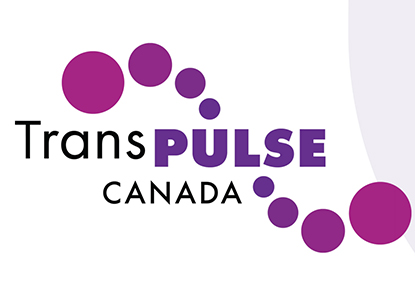Feature: Trans PULSE Canada highlights diverse experiences of trans and non-binary Canadians

By Crystal Mackay, MA’05
A nationwide survey on the health and wellbeing of trans and non-binary Canadians is pinpointing the unique experiences of diverse groups within those communities, including Indigenous people, immigrants and newcomers, and sex workers.
The findings highlight the importance of culture and community to Indigenous trans, non-binary and two-spirit people, and also show that one-third of trans and non-binary newcomers to Canada came here because of fear of persecution related to their gender identity.
 Trans PULSE Canada, based out of Western University, is the first of its kind to collect health and wellbeing data on trans and nonbinary people of all ages from every province and territory. Nearly 3,000 respondents were asked a wide range of questions relating to their mental, physical and psychological health as well as barriers to care.
Trans PULSE Canada, based out of Western University, is the first of its kind to collect health and wellbeing data on trans and nonbinary people of all ages from every province and territory. Nearly 3,000 respondents were asked a wide range of questions relating to their mental, physical and psychological health as well as barriers to care.
Co-principal investigators Ayden Scheim, PhD, and Greta Bauer, PhD, say one of their main goals was to gather data about trans and non-binary people not as a monolithic group, but as a set of diverse groups with varied and unique needs.
“Historically research has treated the trans population as fairly homogenous and this has been a function of the fact that we haven’t had large enough quantitative samples to be able to break the group down more,” said Scheim, Adjunct Assistant Professor at the Schulich School of Medicine & Dentistry and Assistant Professor at Drexel University in Philadelphia. “This national study was a real opportunity to be able to do targeted reports that will also be followed up by other forms of knowledge translation.”
The survey design and interpretation of the results involved community members with lived and professional experience in diverse areas from across the country.
“For us, that’s meant a very large research team who are involved in different capacities and really reflect the diversity of community and academic knowledge,” said Bauer, Professor at Schulich Medicine & Dentistry and CIHR Sex and Gender Science Chair.
The most recent reports from the survey focus specifically on the experiences of trans and non binary Canadians who are also Indigenous, immigrants or sex workers.
Indigenous Priority Population Report
The report highlights the importance to Indigenous people of connection to culture and community. The researchers point out that in sacred and traditional contexts, trans, gender-diverse and two-spirit people were held in high-esteem, often having respected ceremonial roles. However, that has been disrupted by colonization, said Randy Jackson, PhD, co-investigator on the study.
“Our unique experience and culture shape the way in which we understand and experience health, and without adequate information about that it’s difficult to design and plan more responsive and more trans-friendly health services,” said Jackson.
The majority of respondents who were part of an Indigenous community reported active and meaningful participation in their cultural traditions, but 80 per cent nonetheless said there were barriers to participation in traditional ceremonies, including fears of exclusion and feeling unwelcome.
“Connection to community is important to all of our health," said co-investigator Sharp Dopler. "As Indigenous peoples, that is the centre of our being, self-in-community."
Without it, finding balance can be impossible, Dopler said. "The study has clearly indicated the impacts of this connection or disconnection on our minds, bodies, emotions and spirits."
Immigrant and Newcomer Priority Population Report
Nearly one-third of trans and non-binary newcomers reported migrating to Canada due to fear of persecution for their gender identity. And while one in five accessed a settlement service within their first year here, less than half reported that the service met their specific needs.
However, while they are less likely to have a health-care provider than established immigrants or people born in Canada, trans and non-binary newcomers rated their health and mental wellbeing higher than their Canadian-born counterparts. This finding is consistent with what research has shown in the cisgender population as well.
“Considering all of the challenges that people who are both trans or nonbinary and immigrants and newcomers face, the fact that they still report better self-rated mental health really speaks to a high level of resilience,” said Scheim.
Sex Worker Priority Population Report
When exploring the experiences of trans and non-binary people doing sex work, the researchers found they tended to report poorer access to health care than other Trans PULSE Canada respondents, as well as higher levels of violence and discrimination.
A full 84 per cent of sex workers reported worrying that they'd be stopped or harassed by police, while only 4 per cent thought they would be treated fairly by police or the legal system if they were assaulted.
“Having research on our communities’ experiences and needs is vital to help us understand how best to care for each other, and what systemic changes need to be advocated for,” said Sophia Ciavarella, co-investigator. “My hope is this leads to policies designed less to fix or alter trans and non-binary sex workers’ behaviour and more on changing the social and institutional systems that impact trans and non-binary sex workers’ lives.”








